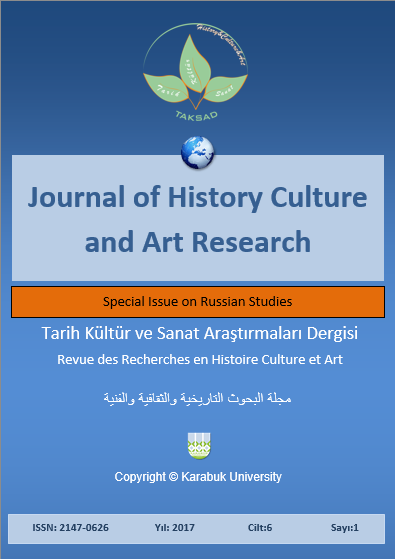Socio-Cultural Factors of the Russian Reforming Process of the 18-20th Centuries
DOI:
https://doi.org/10.7596/taksad.v6i5.1301Özet
The modern Russian reforms aimed at moving the society to a new stage of development are going through a complicated, contradictory way, with great social costs and zigzags of the political course of power. This poses the task of identifying and overcoming the inhibiting factors in the development of the country. One of the most effective mechanisms of such work is the study of the three-hundred-year experience of Russian reformation and the identification of timeless sociocultural and mental risk factors affecting the nature and content of reforms. This article is devoted to this purpose.
In the course of study, we have drawn the conclusions about the deterrent effect on the development of the country of such features of Russian society as its socio-cultural split, absence of internal mechanisms for the self-development of society, lack of a dialogue between government and society, whose relationships are determined by the principle of "antisocial state - anti-state society", mental characteristics of the Russian intelligentsia, which dogmatically implements particular ideas at the expense of economic expediency and common sense, orientation of the ruling elite on the Western values as opposed to national traditions, conservatism and lack of conscious reformative motivation of the masses. This leads to the need to correlate the current reforms not only with the current trends of socio-economic development, but also with the sociocultural foundations of Russian society and the peculiarities of its mentality.
Referanslar
Akhiezer, A. S. (1994). Russia: Criticism of Historical Experience: Modernization in Russia and the Conflict of Values. Мoscow: Nauka. [In Russian].
Antipyev, A. G. (2010). "Archaic" Russian Society and the Problems of its Modernization. Socio-Humanitarian Knowledge, 6, 11-20. [In Russian].
Barulin, V. S. (2000). Russian Man in the XX Century. Loss and Finding Oneself. St. Petersburg: Piter. [In Russian].
Berdyaev, P. A. (1990). The Origins and Meaning of Russian Communism. Мoscow: Mysl. [In Russian].
Boronoev, A. O. & Smirnov, P. I. (1992). Russia and Russians. The Nature of the People and the Fate of the Country. St. Petersburg: Leteya. [In Russian].
Buganov, V. I. (1989). Peter the Great and his Time. Мoscow: Nauka. [In Russian].
Gaydar, E. T. (2007). The Loss of Empire. Lessons of Modern Russia. St. Petersburg: Nestor. [In Russian].
Ilyin, V. V.; Panarin, A. S. & Akhiezer, A. S. (1996). Reforms and Counter-Reforms in Russia. Мoscow: Publishing House of the Moscow State University. [In Russian].
Kovalenko, S. G. (2008). Reforms in Managing the National Economy of the USSR in the mid-1950s-1970s. History Issues, 6, 112-121. [In Russian].
Martsynkovskaya, T. Yu. (1994). Russian Mentality and its Reflection in the Human Sciences. Мoscow: Glagol. [In Russian].
Mironov, B. N. (2003). Social History of Russia during the Empire Period (XVIII - early XX century): Genesis of the Individual, Democratic Family, Civil Society and the Rule of Law. In 2 Volumes. St. Petersburg: Dmitry Bulavin. [In Russian].
National Interests of Russia and Real Priorities of State Policy for a Century and a Half. Round Table. (1996). National History, 5, 121-134. [In Russian].
Pavlenko, N. I. (2000). Catherine the Great. Мoscow: Prospekt. [In Russian].
Rukavishnikov, V. O.; Halman, L. & Esther, P. (1998). Political Cultures and Social Changes. International Comparisons. Мoscow: Flinta. [In Russian].
Shestopal, E. B. (2014). Value Characteristics of the Russian Political Process and the Country's Development Strategy. Political Studies, 2, 61-71. [In Russian].
Zakharova, L. G.; Eklof, B. & Bushnell, J. (1996). Great Reforms in Russia. 1856-1874. Мoscow: Publishing House of the Moscow University. [In Russian].
İndir
Yayınlanmış
Nasıl Atıf Yapılır
Sayı
Bölüm
Lisans
Tarih Kültür ve Sanat Araştırmaları Dergisi'nde yayımlanan tüm çalışmalar Creative Commons 4.0 CC-BY lisansı ile lisanslanmıştır.
Bunları yapmakta özgürsünüz:
- Bu eseri her boyut ve formatta paylaşabilir — kopyalayabilir ve çoğaltabilirsiniz.
- Materyalden Adapte et — karıştır, aktar ve eserin üzerine inşa et
- her türlü amaç için, ticari amaç da dahil
Alttaki şartlar altında:
Atıf — uygun bilgiyi, lisansa linki, and ve değişiklik yapıldıysa değişiklik bilgisinivermelisiniz. Sizi veya kullanımınızı lisansörün onayladığı bilgisini içermemek kaydıyla, size uygun şekilde bu işlemleri gerçekleştirebilirsiniz.
AynıLisanslaPaylaş — Eğer materyali karıştırdınızsa, aktardınızsa ya da materyalin üzerine çalıştınızsa, ancak aynı lisans ile dağıtabilirsiniz.
- Ek sınırlamalar yoktur — Lisansın izin verdiği hakları başkaları üzerinde kanunlarla ya da teknolojiyikullanarak sınırlayamazsınız.







